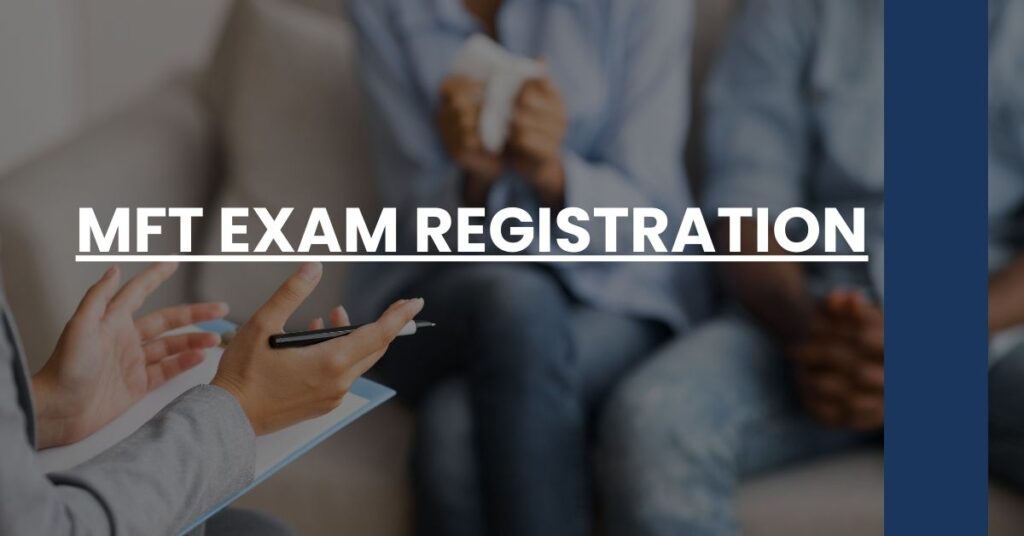MFT Exam Registration is your gateway to a professional career in therapy.
- Streamlined Registration Process: Simplify your MFT Exam journey with clear steps.
- Eligibility Requirements: Understand the prerequisites to qualify for the MFT Exam.
- Testing Centers and Dates: Locate your nearest test center and secure your exam date.
Effortlessly navigate your MFT Exam Registration with this guide.
- Understanding the MFT Exam
- Eligibility Criteria for the MFT Exam
- The Comprehensive MFT Exam Registration Process
- Preparing for Exam Day: What to Expect
- Key Deadlines and Timing for Registration
- Tips for a Smooth MFT Exam Registration Experience
- The Handbook for Candidates: Your Essential Resource
- Special Accommodations for Exam-Takers
- Exam Rescheduling and Retake Policies
- Understanding Scores and Scoring
- Post-Exam Steps: From Results to Licensure
- Frequently Asked Questions (FAQs) About the MFT Exam
- Conclusion: Your Pathway to Becoming a Licensed MFT
Understanding the MFT Exam
As an aspiring marriage and family therapist, the MFT Exam represents a significant milestone on your journey to professional licensure. Administered by the Association of Marital & Family Therapy Regulatory Boards (AMFTRB), this examination is a comprehensive assessment ensuring that candidates have mastered the necessary skills and knowledge in six key domains of marital and family therapy practice.
The Significance of the MFT Exam
For most states, passing the MFT Exam is mandatory for attaining your license to practice. This rigorously designed test gauges your readiness to provide effective therapy and is a testament to your dedication and expertise. Whether you have completed your supervised hours or are just about to, knowing the importance of this exam helps lay the groundwork for a focused and strategic approach to registration and preparation.
Eligibility Criteria for the MFT Exam
Before you leap into the registration process, it’s crucial to confirm that you meet the MFT Exam eligibility criteria. The standards often vary by state, but there are common threads to guide you:
- Educational Qualification: A completed graduate degree in marriage and family therapy or a related field from an accredited institution is typically required.
- Pre-licensing Coursework: Some states may demand additional courses or supervised clinical experience prior to exam registration.
- State Approval: Receiving your Approval Code from your state’s licensing board ensures you are eligible to sit for the exam.
For a closer look at state-specific requirements, websites like the California Board of Behavioral Sciences can offer comprehensive insights.
The Comprehensive MFT Exam Registration Process
Embarking on your MFT Exam registration should be approached with meticulous attention to detail. Following the right steps not only helps ensure a hassle-free experience but also sets a tone of professionalism that you’ll carry into your therapy practice.
Step-by-Step Registration
- Step 1: Obtain your Approval Code. Start by contacting your state or jurisdiction’s licensing board to acquire this necessary code.
- Step 2: Visit the PTC/AMFTRB website to complete the online application. Here you will enter your Approval Code and other pertinent information.
- Step 3: Gear up for a fee of $365. Payment is a pivotal part of the application process; make sure your finances are in order.
- Step 4: Finally, schedule your exam through Prometric, the official testing center for the MFT Exam. You’ll receive your test date and location within six weeks of application.
Missing any of these steps could toggle your application into limbo, so proceed with diligence and foresight.
Planning Ahead
Avoid unnecessary stress by marking application and test dates on your calendar well ahead of time. Consider setting reminders a week before each deadline, so nothing falls through the cracks.
Preparing for Exam Day: What to Expect
When D-Day arrives, you want to be fully primed not just mentally, but logistically as well. On exam day, there are essential considerations to bear in mind:
- Arrival Time: Aim to arrive at the testing center at least 30 minutes early to alleviate last-minute pressures.
- Identification Documents: A valid, government-issued photo ID is compulsory. Verify that your identification is current and readily available.
- Permissible Items: Understand what you can bring into the exam room. Usually, personal belongings are limited to essentials for identity verification and comfort.
Taking a Prometric Test Drive can take a considerable weight off your shoulders by familiarizing you with the testing environment and procedures beforehand.
Key Deadlines and Timing for Registration
Staying aware of the pivotal deadlines is as crucial as any study session. Key timelines include:
- Registration Deadline: Typically set for the first of the month preceding the exam month—if missed, expect to encounter delays or additional fees.
Check out the AMFTRB’s scheduling page for a closer look at specific dates to keep on your radar.
Tips for a Smooth MFT Exam Registration Experience
The registration process may feel daunting, but with the right approach, you can navigate it with ease. Keep these tips in mind:
- Get Organized: Assemble all the necessary documents and information before beginning your application.
- Understand the Platform: Familiarize yourself with the PTC/AMFTRB application site to avoid common mistakes.
- Communicate with State Boards: Maintain direct lines with your state’s regulatory entities to anticipate any changes in the licensure process.
A little preparation goes a long way in ensuring that your MFT Exam Registration sets the tone for success.
The Handbook for Candidates: Your Essential Resource
When it comes to MFT Exam Registration, the Handbook for Candidates is a treasure trove of information. It’s a compass that guides you through the exam framework and policies.
###Why the Handbook is Indispensable
- Exam Content Areas: Get a deeper understanding of what knowledge areas the MFT Exam covers. This is where you’ll uncover the specifics about the domains of practice and types of questions you can anticipate.
- Exam Policies: The handbook delineates the rules and regulations governing the exam. These policies cover everything from acceptable IDs to prohibited items at the testing center. You don’t want to miss these crucial instructions that could impact your exam participation.
- Procedural Guidelines: It walks you through procedures right from the application process to what happens post-exam. It’s a handy outline of the entire timeline you’re going to navigate.
Dive into the Handbook early in your preparation. Understand what lies ahead and take on your MFT Exam with confidence.
Special Accommodations for Exam-Takers
True to its spirit of inclusivity, the testing body offers special accommodations for the MFT Exam to applicants with disabilities. Applying for these accommodations is a matter of providing the right documentation and doing so within the set timelines.
###Requesting Accommodations
- Submit Documentation: Secure and submit professional documentation that verifies your condition. It’s essential the documentation reflects the accommodations you’ve previously received in similar testing scenarios.
- Plan and Apply Early: Requests for accommodations take time to process. It’s recommended to submit your request roughly eight weeks before your exam date. Check the AMFTRB website for application forms and detailed procedures on how to file your request.
Exam Rescheduling and Retake Policies
Life is unpredictable. If you find yourself needing to reschedule the MFT Exam, understanding the rescheduling policy is critical. Additionally, if you need to retake the exam, familiarize yourself with the retake policy to plan your next steps effectively.
###Handling Changes and Retakes
- Rescheduling Fees: While adjustments within the exam window might cost you an extra fee, changing your exam date to a different month is allowed once without incurring additional costs.
- Retake Protocol: In case you don’t pass the exam, don’t lose heart. The retake policy permits candidates to sit for the exam again, though you must adhere to the stipulated waiting period and potential additional fees.
Understanding Scores and Scoring
After all the hard work you put into studying and MFT Exam Registration, comprehending how the exam is scored adds an important piece to your preparation puzzle.
###Demystifying Exam Scores
- How Scores are Calculated: Your final score is a reflection of your knowledge and understanding of the material tested. Each question you face on the exam contributes to this cumulative score.
- Passing Threshold: Reaching or surpassing the passing score is what stands between you and your goal of being a licensed marital and family therapist.
- Score Reporting: Typically, your results will be sent to the licensing board within 20 business days after the testing period concludes.
Post-Exam Steps: From Results to Licensure
Once you have your exam results in hand, the journey toward licensure shifts into a new phase. Whether you’re celebrating your passing score or contemplating a retake, there are definite steps to follow.
###Your Post-Exam Action Plan
- Interpreting Results: If you’ve passed, start prepping your application for licensure. If the outcome wasn’t as hoped, strategize for your retake.
- Next Steps: Passage of the MFT Exam often prompts immediate inquiries regarding the licensure process – a crucial bridge to your role as a therapist.
Frequently Asked Questions (FAQs) About the MFT Exam
Here, we tackle some of the most common queries related to the MFT Exam to alleviate any lingering concerns you might have about this process.
Your Concerns Addressed
- Can I take the exam if I’m from a different state? Yes, but ensure you meet the eligibility requirements of the state where you intend to gain licensure.
- What materials are best for exam preparation? There are many study guides and online resources specifically tailored for MFT Exam prep. Conduct thorough research and choose material that aligns with the exam content areas outlined in the Handbook for Candidates.
- How often is the MFT Exam offered? The exam is typically offered during specific testing windows throughout the year. Keep an eye on the registration deadlines that apply.
Conclusion: Your Pathway to Becoming a Licensed MFT
Your dedication and effort toward fulfilling the MFT Exam Registration requirements signify an inspiring commitment to your professional goal. While the road to becoming a licensed marriage and family therapist may be demanding, with earnest preparation and a clear understanding of the registration process, you’re setting yourself up for genuine success. Lean on the resources created to aid your journey and remember, each step forward is a step closer to achieving your career ambitions as a marriage and family therapist.
MFT Exam Registration: Discover the essential steps for licensure with our comprehensive guide, ensuring a successful exam application process.

